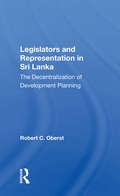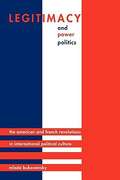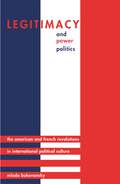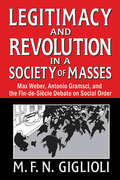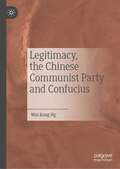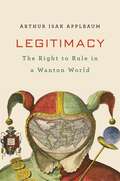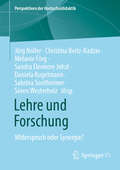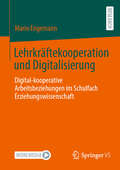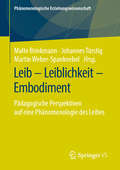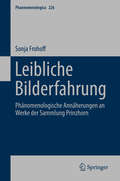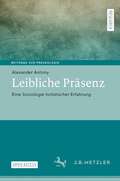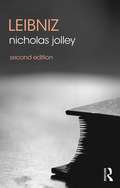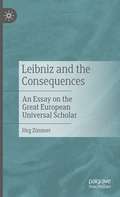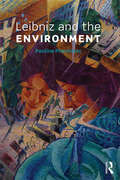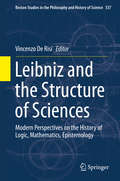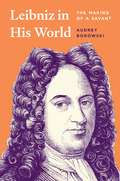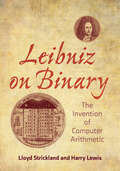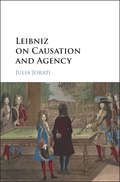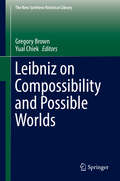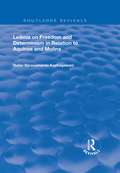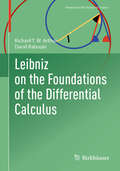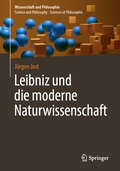- Table View
- List View
Legislators And Representation In Sri Lanka: The Decentralization Of Development Planning
by Robert C. OberstFocusing on the work of Sri Lankan legislators, this book offers a model of representation in examining parliamentary systems, especially those found in the Third World. It explores an important part of legislators' responsibilities as the country seeks to decentralize its development planning.
Legitimacy and Power Politics: The American and French Revolutions in International Political Culture
by Mlada BukovanskyThis book examines the causes and consequences of a major transformation in both domestic and international politics: the shift from dynastically legitimated monarchical sovereignty to popularly legitimated national sovereignty. It analyzes the impact of Enlightenment discourse on politics in eighteenth-century Europe and the United States, showing how that discourse facilitated new authority struggles in Old Regime Europe, shaped the American and French Revolutions, and influenced the relationships between the revolutionary regimes and the international system. The interaction between traditional and democratic ideas of legitimacy transformed the international system by the early nineteenth century, when people began to take for granted the desirability of equality, individual rights, and restraint of power. Using an interpretive, historically sensitive approach to international relations, the author considers the complex interplay between elite discourses about political legitimacy and strategic power struggles within and among states. She shows how culture, power, and interests interacted to produce a crucial yet poorly understood case of international change. The book not only shows the limits of liberal and realist theories of international relations, but also demonstrates how aspects of these theories can be integrated with insights derived from a constructivist perspective that takes culture and legitimacy seriously. The author finds that cultural contests over the terms of political legitimacy constitute one of the central mechanisms by which the character of sovereignty is transformed in the international system--a conclusion as true today as it was in the eighteenth century.
Legitimacy and Power Politics: The American and French Revolutions in International Political Culture (Princeton Studies in International History and Politics #120)
by Mlada BukovanskyThis book examines the causes and consequences of a major transformation in both domestic and international politics: the shift from dynastically legitimated monarchical sovereignty to popularly legitimated national sovereignty. It analyzes the impact of Enlightenment discourse on politics in eighteenth-century Europe and the United States, showing how that discourse facilitated new authority struggles in Old Regime Europe, shaped the American and French Revolutions, and influenced the relationships between the revolutionary regimes and the international system. The interaction between traditional and democratic ideas of legitimacy transformed the international system by the early nineteenth century, when people began to take for granted the desirability of equality, individual rights, and restraint of power. Using an interpretive, historically sensitive approach to international relations, the author considers the complex interplay between elite discourses about political legitimacy and strategic power struggles within and among states. She shows how culture, power, and interests interacted to produce a crucial yet poorly understood case of international change. The book not only shows the limits of liberal and realist theories of international relations, but also demonstrates how aspects of these theories can be integrated with insights derived from a constructivist perspective that takes culture and legitimacy seriously. The author finds that cultural contests over the terms of political legitimacy constitute one of the central mechanisms by which the character of sovereignty is transformed in the international system--a conclusion as true today as it was in the eighteenth century.
Legitimacy and Revolution in a Society of Masses: Max Weber, Antonio Gramsci, and the Fin-de-Sicle Debate on Social Order
by M. F. N. GiglioliQuestions surrounding the concept of legitimacy—the force that keeps a polity together, and whose absence causes it to shatter—are possibly the most important concern of a study of politics. M. F. N. Giglioli examines the shift to a distinctly modern understanding of the concept in Continental Europe, following the crisis of liberal rationalism in the late nineteenth century, and the search for new ways of envisaging the determinants of collective action into the twentieth century.The author examines certain aspects of the intellectual and political background of early twentieth-century theories of legitimacy elaborated by Max Weber and Antonio Gramsci. These theories are interpreted as the outcome of a contested process of redefinition of the concept, itself prompted by the social and political circumstances of the late nineteenth century, such as economic modernization and the attempt to incorporate the working class into the political system.This is the first book in a generation to offer a general reassessment of issues of legitimacy in political thought at the turn of the twentieth century. It examines the development of the concept in France, Italy, and Germany during the half-century or so following the Paris Commune. It discusses six key critics of classical Victorian liberalism on the revolutionary Left and the conservative Right. The political position and biography of each is a central focus of the study, as the culture of the age was decisively shaped by reflection on the social role of intellectuals.
Legitimacy, the Chinese Communist Party and Confucius
by Wai Kong NgThis book explores the use of Confucianism by the Chinese Communist Party in its assertion of political legitimacy. Confucian thought offers an enduring framework for political legitimacy in East Asian societies, including China. All states strive to acquire legitimacy, and despite once denouncing Confucianism as the remnants of feudal poison, the Party is turning towards Confucianism as part of its legitimation efforts. This suggests that the Party is suffering from an ideological void in terms of legitimacy and legitimation due to the diminishing relevance of Marxism in Chinese societal practices. The book will devise a non-liberal legitimacy framework, drawing on the ideas of Habermas and Bernard Williams, to examine the legitimacy of the Party, and use an analysis of the elite discourse to determine the nature of the Confucian turn, in a sharp polemic that will interest scholars of Chinese politics, of the role of traditional beliefs in Asian modernity, and in China's future.
Legitimacy: The Right to Govern in a Wanton World
by Arthur Isak ApplbaumWhat makes a government legitimate? Arthur Isak Applbaum rigorously argues that the greatest threat to democracies today is not loss of basic rights or despotism. It is the tyranny of unreason: domination of citizens by incoherent, inconstant, incontinent rulers. A government that cannot govern itself cannot legitimately govern others.
Lehr-/Lernkulturen in der wissenschaftlichen Weiterbildung (Theorie und Empirie Lebenslangen Lernens)
by Sandra HabeckDer Sammelband betrachtet Lehr-/Lernkulturen in der wissenschaftlichen Weiterbildung aus mikro-, meso- und makrodidaktischer Perspektive.Unter diversen theoretischen sowie forschungsmethodischen Zugängen werden in den Beiträgen zentrale Aspekte und Fragestellungen hinsichtlich des Lehrens und Lernens in der wissenschaftlichen Weiterbildung beleuchtet und analysiert. In den einzelnen Forschungsarbeiten rücken unter anderem kontextspezifische als auch fachkulturelle Differenzierungen, immanente Spannungsverhältnisse sowie schließlich bedeutsame Ausrichtungen der Lehr-/Lernkulturen in der wissenschaftlichen Weiterbildung in den Blick.
Lehre und Forschung: Widerspruch oder Synergie? (Perspektiven der Hochschuldidaktik)
by Jörg Noller Christina Beitz-Radzio Daniela Kugelmann Sabrina Sontheimer Sören Westerholz Melanie Förg Sandra Eleonore JohstDer Sammelband ist der Frage gewidmet, wie sich Forschung und Lehre zueinander verhalten. Hochschulmitarbeitende stehen vor der Herausforderung, Forschung und Lehre in einem Spannungsfeld aus Anreizsystemen, Zeitmangel und persönlichen Interessen unter einen Hut zu bringen. Dabei wird der Renommee bringenden Forschung oftmals der Vorzug gegeben, die Lehre dabei zum notwendigen Übel reduziert. Doch stehen Forschung und Lehre wirklich in einem Widerspruch? Oder ist es nicht auch möglich, dass die Forschung durch die Lehre, und die Lehre durch die Forschung profitiert, so dass zwischen beiden eine synergetische Wechselwirkung bestehen kann?
Lehrkräftekooperation und Digitalisierung: Digital-kooperative Arbeitsbeziehungen im Schulfach Erziehungswissenschaft
by Mario EngemannDie Herausforderungen des digitalen Transformationsprozesses tangieren das öffentliche und private Leben – davon ist selbstredend auch die Schule und der Unterricht betroffen. Zugleich gilt die Lehrkräftekooperation als eine Möglichkeit, um gesellschaftlichen Herausforderungen in Schulen begegnen zu können. Davon ausgehend untersucht Mario Engemann die digital-kooperativen Arbeitsbeziehungen von Lehrkräften – exemplarisch am gymnasialen Schulfach Erziehungswissenschaft. Unter Rückgriff auf ein Mixed-Methods-Design beantwortet er die Frage, wie sich die Lehrkräftekooperation hinsichtlich der Digitalisierung in Formen, Gestaltung und Rahmenbedingungen darstellt. Die empirische Datenbasis der Arbeit bilden ein eigens unter Berücksichtigung bestehender Items zur Lehrkräftekooperation konzipierter quantitativer Fragebogen sowie Expert*inneninterviews mit Lehrkräften.
Leib und Konzentration: Eine neuphänomenologische Untersuchung am Beispiel der musikalischen Performanz (Vital Turn: Leib, Körper, Emotionen)
by Yü-Yen LiUnter Bezugnahme auf die Neue Phänomenologie von Hermann Schmitz und auf der Grundlage eigener Konzerterfahrungen geht die Autorin erstmals dem Zusammenhang von Leib und Konzentration nach. Sie zeigt, dass Konzentration nicht bloß eine gedankliche Selbstdisziplinierung ist, sondern primär das Gewahren der eigenen Gefühlswelt erfordert. Dabei gelingt ihr ein Brückenschlag zwischen Theorie und Praxis: zum einen leistet sie einen Beitrag zur Phänomenologie der Konzentration und zur Philosophie der Emotionen, zum anderen erschließt sie professionellen Musikern und Musikpädagogen eine leibphänomenologische Zugangsweise zur musikalischen Praxis.
Leib – Leiblichkeit – Embodiment: Pädagogische Perspektiven auf eine Phänomenologie des Leibes (Phänomenologische Erziehungswissenschaft #8)
by Malte Brinkmann Johannes Türstig Martin Weber-SpanknebelIn diesem Band werden ausgehend von systematischen Studien zum Verhältnis von Leib, Lernen, Bildung und Erziehung neue Impulse aus der empirischen Bildungsforschung, den Neurowissenschaften und der Postphänomenologie aufgegriffen: Phänomenologische und pädagogische Perspektiven auf Leiblichkeit und Embodiment werden mit diskurs- und praxistheoretischen, neurophänomenologischen sowie Perspektiven der Gender Studies verknüpft und auf die pädagogischen Praxisfelder Digitalisierung, Schule und Kindergarten bezogen.
Leibliche Bilderfahrung: Phänomenologische Annäherungen an Werke der Sammlung Prinzhorn (Phaenomenologica #226)
by Sonja FrohoffWas ist Wahnsinn und was ist Kunst? In dem Buch wirft die Autorin einen neuen Blick auf Kunstwerke aus der weltberühmten Sammlung Prinzhorn in Heidelberg. Die Werke, die um das Jahr 1900 von Patienten in psychiatrischen Einrichtungen geschaffen wurden, werden erstmals aus einer phänomenologischen Perspektive heraus betrachtet. Ausgangspunkt ist die Phänomenologie des Philosophen Maurice Merleau-Ponty und seines Konzepts von Leiblichkeit. Im Mittelpunkt stehen die Werke von Elisabeth Faulhaber, Carl Lange und Edmund Träger. Die Autorin befragt die Werke der drei Art-Brut-Künstler nach den darin zum Ausdruck kommenden Zeit- und Raumordnungen, nach dem Verhältnis der Künstler zu sich selbst und zur Welt. Diese Bildbetrachtungen ermöglichen es Lesern, sich den Künstlern anzunähern und ihr „Zur-Welt-Sein“ nachzuvollziehen. Das vermeintlich Kranke wird durch die Analyse der Bildsprache als existenzielle und momentane Balancefindung verstehbar. Was auf den ersten Blick fremd erscheint, wird auf Ordnungsstrukturen und Metaphernbildungen im schöpferischen Prozess zurückgeführt. So entwickelt die Autorin ein neues Verständnis von Kunst, geschaffen von Menschen in Phasen existenzieller seelischer Krisen. Sie geht damit weit über kunsthistorische Analysen auf der einen und psychiatrische Diagnosen auf der anderen Seite hinaus und stellt gängige Definitionen von Kunst und Krankheit in Frage. Die Autorin erweitert die wissenschaftliche Debatte zu Phänomenologie und Bildsprache und bringt dafür erstmals alle verfügbaren Quellen und Erkenntnisse zu den drei Vertretern der Outsider Art zusammen. Ein Buch für Phänomenologen, Kunsthistoriker, Psychiater und Psychotherapeuten, das auch interessierten Laien eine Kunstbetrachtung aus phänomenologischer Perspektive bietet.
Leibliche Präsenz: Eine Soziologie holistischer Erfahrung (Beiträge zur Praxeologie / Contributions to Praxeology)
by Alexander AntonyIn welcher Hinsicht können körperlich-leibliche Erfahrungen als Teil sozialer Aktivitäten verstanden werden und wie kann man sie sozialwissenschaftlich untersuchen? Unter Rückgriff auf den klassischen Pragmatismus, insbesondere John Dewey, und soziologische Praxistheorien leistet Alexander Antony einen Beitrag zur Beantwortung dieser Fragen. Er entwickelt eine Soziologie leiblicher Praxis, welche Sozialtheorie, methodologische Reflexion und die Erforschung der Produktion ge- und erlebter Körperlichkeit miteinander verschränkt. Empirisch widmet sich das Buch aus einer diskursanalytischen und ethnographischen Perspektive der Praktik der Atemarbeit, einem „ganzheitlichen“ Therapie- und Selbsterfahrungsangebot. Die Atemarbeit zielt darauf, eine bewusst erlebte leibliche Selbstbezüglichkeit zu etablieren, um derart körperliches, psychisches und seelisch-spirituelles Wohlbefinden zu befördern. Auf unterschiedlichen Analyseebenen spürt der Autor der Frage nach, wie individuelles leibliches Erleben und die diskursive und soziomaterielle Produktion von Erfahrungssituationen zusammenspielen. Die zentrale Einsicht: Sozialität geht buchstäblich unter die Haut.Dies ist ein Open-Access-Buch.
Leibniz
by Maria Rosa AntognazzaOf all the thinkers of the century of genius that inaugurated modern philosophy, none lived an intellectual life more rich and varied than Gottfried Wilhelm Leibniz (1646-1716). Trained as a jurist and employed as a counsellor, librarian, and historian, he made famous contributions to logic, mathematics, physics, and metaphysics, yet viewed his own aspirations as ultimately ethical and theological, and married these theoretical concerns with politics, diplomacy, and an equally broad range of practical reforms: juridical, economic, administrative, technological, medical, and ecclesiastical. Maria Rosa Antognazza's pioneering biography not only surveys the full breadth and depth of these theoretical interests and practical activities, it also weaves them together for the first time into a unified portrait of this unique thinker and the world from which he came. At the centre of the huge range of Leibniz's apparently miscellaneous endeavours, Antognazza reveals a single master project lending unity to his extraordinarily multifaceted life's work. Throughout the vicissitudes of his long life, Leibniz tenaciously pursued the dream of a systematic reform and advancement of all the sciences, to be undertaken as a collaborative enterprise supported by an enlightened ruler; these theoretical pursuits were in turn ultimately grounded in a practical goal: the improvement of the human condition and thereby the celebration of the glory of God in His creation. As well as tracing the threads of continuity that bound these theoretical and practical activities to this all-embracing plan, this illuminating study also traces these threads back into the intellectual traditions of the Holy Roman Empire in which Leibniz lived and throughout the broader intellectual networks that linked him to patrons in countries as distant as Russia and to correspondents as far afield as China.
Leibniz (The Routledge Philosophers)
by Nicholas JolleyGottfried Wilhelm Leibniz (1646-1716) was hailed by Bertrand Russell as 'one of the supreme intellects of all time'. A towering figure in seventeenth-century philosophy, his complex thought has been championed and satirized in equal measure, most famously in Voltaire's Candide. In this outstanding introduction to his philosophy, Nicholas Jolley introduces and assesses the whole of Leibniz's philosophy. Beginning with an introduction to Leibniz's life and work, he carefully introduces the core elements of Leibniz's metaphysics: his theories of substance, identity and individuation; monads and space and time; and his important debate over the nature of space and time with Newton's champion, Samuel Clarke. He then introduces Leibniz's theories of mind, knowledge, and innate ideas, showing how Leibniz anticipated the distinction between conscious and unconscious states, before examining his theory of free will and the problem of evil. An important feature of the book is its introduction to Leibniz's moral and political philosophy, an overlooked aspect of his work. The final chapter assesses legacy and the impact of his philosophy on philosophy as a whole, particularly on the work of Immanuel Kant. Throughout, Jolley places Leibniz in relation to some of the other great philosophers, such as Descartes, Spinoza and Locke, and discusses Leibniz's key works, such as the Monadology and Discourse on Metaphysics. This second edition has been revised throughout and includes a new chapter on Leibniz and philosophy of language.
Leibniz and the Consequences: An Essay on the Great European Universal Scholar
by Jörg ZimmerLeibniz was probably the last universal scholar in modern times who made original and innovative achievements in all the essential fields of knowledge of his time: as a reform-oriented lawyer, a multilateral thinking diplomat, as a mathematician of infinitesimal calculus, as the inventor of a calculating machine and in the mining of horizontal wind power, as an organizer of science and as one of the first historians who strived for source-critical methodical objectivity. However, this baroque diversity can only be understood from the center of a monadological philosophy, which wants to establish the unity of scientific worldview and metaphysical concept of the world. It is distorted in the classical reception because only Leibniz the Theodicy was known. The topicality of Leibniz today consists in re-exposing the original basic idea of unity in diversity and asking how it can be made fruitful for philosophical and political thought in the 21st century. This book is a translation of the original German 1st edition Leibniz und die Folgen by Jörg Zimmer, published by J.B. Metzler, imprint of Springer-Verlag GmbH, part of Springer Nature in 2018. The translation was done with the help of artificial intelligence (machine translation by the service DeepL.com). A subsequent human revision was done primarily in terms of content, so that the book will read stylistically differently from a conventional translation. Springer Nature works continuously to further the development of tools for the production of books and on the related technologies to support the authors.
Leibniz and the Environment
by Pauline PhemisterThe work of seventeenth-century polymath Gottfried Wilhelm Leibniz has proved inspirational to philosophers and scientists alike. In this thought-provoking book, Pauline Phemister explores the ecological potential of Leibniz’s dynamic, pluralist, panpsychist, metaphysical system. She argues that Leibniz’s philosophy has a renewed relevance in the twenty-first century, particularly in relation to the environmental change and crises that threaten human and non-human life on earth. Drawing on Leibniz’s theory of soul-like, interconnected metaphysical entities he termed 'monads', Phemister explains how an individual’s true good is inextricably linked to the good of all. Phemister also finds in Leibniz’s works the rudiments of a theory of empathy and strategies for strengthening human feelings of compassion towards all living things. Leibniz and the Environment is essential reading for historians of philosophy and environmental philosophers, and will also be of interest to anyone seeking a metaphysical perspective from which to pursue environmental action and policy.
Leibniz and the Structure of Sciences: Modern Perspectives on the History of Logic, Mathematics, Epistemology (Boston Studies in the Philosophy and History of Science #337)
by Vincenzo De RisiThe book offers a collection of essays on various aspects of Leibniz’s scientific thought, written by historians of science and world-leading experts on Leibniz. The essays deal with a vast array of topics on the exact sciences: Leibniz’s logic, mereology, the notion of infinity and cardinality, the foundations of geometry, the theory of curves and differential geometry, and finally dynamics and general epistemology. Several chapters attempt a reading of Leibniz’s scientific works through modern mathematical tools, and compare Leibniz’s results in these fields with 19th- and 20th-Century conceptions of them. All of them have special care in framing Leibniz’s work in historical context, and sometimes offer wider historical perspectives that go much beyond Leibniz’s researches. A special emphasis is given to effective mathematical practice rather than purely epistemological thought. The book is addressed to all scholars of the exact sciences who have an interest in historical research and Leibniz in particular, and may be useful to historians of mathematics, physics, and epistemology, mathematicians with historical interests, and philosophers of science at large.
Leibniz in His World: The Making of a Savant
by Audrey BorowskiA sweeping intellectual biography that restores the Enlightenment polymath to the intellectual, scientific, and courtly worlds that shaped his early life and thoughtDescribed by Voltaire as &“perhaps a man of the most universal learning in Europe,&” Gottfried Wilhelm Leibniz (1646–1716) is often portrayed as a rationalist and philosopher who was wholly detached from the worldly concerns of his fellow men. Leibniz in His World provides a groundbreaking reassessment of Leibniz, telling the story of his trials and tribulations as an aspiring scientist and courtier navigating the learned and courtly circles of early modern Europe and the Republic of Letters.Drawing on extensive correspondence by Leibniz and many leading figures of the age, Audrey Borowski paints a nuanced portrait of Leibniz in the 1670s, during his &“Paris sojourn&” as a young diplomat and in Germany at the court of Duke Johann Friedrich of Hanover. She challenges the image of Leibniz as an isolated genius, revealing instead a man of multiple identities whose thought was shaped by a deep engagement with the social and intellectual milieus of his time. Borowski shows us Leibniz as he was known to his contemporaries, enabling us to rediscover him as an enigmatic young man who was complex and all too human.An exhilarating work of scholarship, Leibniz in His World demonstrates how this uncommon intellect, torn between his ideals and the necessity to work for absolutist states, struggled to make a name for himself during his formative years.
Leibniz on Binary: The Invention of Computer Arithmetic
by Lloyd Strickland Harry R. LewisThe first collection of Leibniz&’s key writings on the binary system, newly translated, with many previously unpublished in any language.The polymath Gottfried Wilhelm Leibniz (1646–1716) is known for his independent invention of the calculus in 1675. Another major—although less studied—mathematical contribution by Leibniz is his invention of binary arithmetic, the representational basis for today&’s digital computing. This book offers the first collection of Leibniz&’s most important writings on the binary system, all newly translated by the authors with many previously unpublished in any language. Taken together, these thirty-two texts tell the story of binary as Leibniz conceived it, from his first youthful writings on the subject to the mature development and publication of the binary system. As befits a scholarly edition, Strickland and Lewis have not only returned to Leibniz&’s original manuscripts in preparing their translations, but also provided full critical apparatus. In addition to extensive annotations, each text is accompanied by a detailed introductory &“headnote&” that explains the context and content. Additional mathematical commentaries offer readers deep dives into Leibniz&’s mathematical thinking. The texts are prefaced by a lengthy and detailed introductory essay, in which Strickland and Lewis trace Leibniz&’s development of binary, place it in its historical context, and chart its posthumous influence, most notably on shaping our own computer age.
Leibniz on Causation and Agency
by Julia JoratiThis book presents a comprehensive examination of Gottfried Leibniz's views on the nature of agents and their actions. Julia Jorati offers a fresh look at controversial topics including Leibniz's doctrines of teleology, the causation of spontaneous changes within substances, divine concurrence, freedom, and contingency, and also discusses widely neglected issues such as his theories of moral responsibility, control, attributability, and compulsion. Rather than focusing exclusively on human agency, she explores the activities of non-rational substances and the differences between distinctive types of actions, showing how the will, appetitions, and teleology are key to Leibniz's discussions of agency. Her book reveals that Leibniz has a nuanced and compelling philosophy of action which has relevance for present-day discussions of agency. It will be of interest to scholars and students of early modern philosophy as well as to metaphysicians and philosophers of action.
Leibniz on Compossibility and Possible Worlds
by Gregory Brown Yual ChiekThis volume brings together a number of original articles by leading Leibniz scholars to address the meaning and significance of Leibniz's notions of compossibility and possible worlds. In order to avoid the conclusion that everything that exists is necessary, or that all possibles are actual, as Spinoza held, Leibniz argued that not all possible substances are compossible, that is, capable of coexisting. In Leibniz's view, the compossibility relation divides all possible substances into disjoint sets, each of which constitutes a possible world, or a way that God might have created things. For Leibniz, then, it is the compossibility relation that individuates possible worlds; and possible worlds form the objects of God's choice, from among which he chooses the best for creation. Thus the notions of compossibility and possible worlds are of major significance for Leibniz's metaphysics, his theodicy, and, ultimately, for his ethics. Given the fact, however, that none of the approaches to understanding Leibniz's notions of compossibility and possible words suggested to date have gained universal acceptance, the goal of this book is to gather a body of new papers that explore ways of either refining previous interpretations in light of the objections that have been raised against them, or ways of framing new interpretations that will contribute to a fresh understanding of these key notions in Leibniz's thought.
Leibniz on Freedom and Determinism in Relation to Aquinas and Molina (Routledge Revivals)
by Didier Njirayamanda KaphagawaniFirst published in 1999, this volume considers the 17th century philosopher Leibniz and his views on Freedom and Determinism, aiming to show that his solution is in many respects superior to those of Aquinias and Molina. The author thoroughly explores Leibniz in the light of Aquinas and Molina, first examining their positions on freedom and determinism, followed by Leibniz on freedom, contingency and determinism, the denial of freedom of pure indifference, freedom and divine foreknowledge and major interpretations of his philosophy.
Leibniz on the Foundations of the Differential Calculus (Frontiers in the History of Science)
by David Rabouin Richard T. ArthurThis monograph presents an interpretive essay on the foundations of Leibniz’s calculus, accompanied by key texts in English translation. The essay examines Leibniz's evolving views on infinitesimals and infinite numbers, tracing their development from his early metaphysical ideas to his mature justifications of the calculus. Leibniz first proposed treating infinitesimals as fictions in the 1670s, in line with the mathematical practices of his time, where abstract concepts could be used in calculations without implying their existence. By 1676, he rejected their status as quantities, yet continued to refine his arguments on this topic into the 1690s. The essay concludes with an analysis of Leibniz’s defense of his calculus in the early 18th century, showing how his later works naturally extended from earlier insights. This monograph will be a valuable resource for scholars and students of Leibniz and the history of science.
Leibniz und die moderne Naturwissenschaft (Wissenschaft und Philosophie – Science and Philosophy – Sciences et Philosophie)
by Jürgen JostWas hat ein Gelehrter des 17.Jahrhunderts noch für die heutigen Naturwissenschaften zu sagen? Eine ganze Menge, so zeigt sich in diesem Buch. Gottfried Wilhelm Leibniz (1646-1716) war ein Universalgenie, und ihm gelangen bahnbrechende Leistungen in fast allen Gebieten der Wissenschaft, insbesondere in der Philosophie (Relativität von Raum und Zeit), der Mathematik (Infinitesimalrechnung, Determinantentheorie, binäres Zahlsystem, Konstruktion einer Rechenmaschine), der Logik (Prädikaten- und Modallogik, Konzept der möglichen Welten), der Physik (Energieerhaltung und Aktionsprinzip), der Erd- und Menschheitsgeschichte, der Rechtswissenschaft und der Theologie. Diese Leistungen waren aber nicht isoliert, sondern eingebettet in ein umfassendes System, das auf dem Satz vom Widerspruch, dem Satz vom zureichenden Grunde und dem Kontinuitätsprinzip beruhte. Erst durch das Verständnis dieses Systems erschließen sich die Einheit und die Spannweite seines Denkens. Jürgen Jost, der wie nur wenige andere die verschiedenen Wissenschaften überblickt, konfrontiert dieses leibnizsche System mit den Ansätzen, Denkweisen und Ergebnissen der heutigen Naturwissenschaften, insbesondere der Quantenphysik, der Relativitätstheorie und Kosmologie, der modernen Logik, der Evolutionsbiologie und der Hirnforschung. Es zeigt sich, dass das leibnizsche System in vieler Hinsicht noch aktuell ist und sich bewährt, aber auch in manchen Positionen revidiert werden muss. Hieraus ergeben sich neue Einsichten sowohl in das leibnizsche System als auch in die heutigen Naturwissenschaften.
